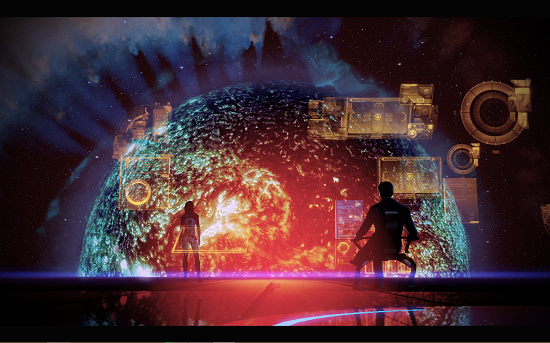
Cerberus
For 106 hours (24 ME1, 33 ME2, 59 ME3) over the last six months, I have been exploring the epic science fiction worlds of Mass Effect (ME). I could have easily only spent 60 hours there, since that’s enough time to get through the game, but I was genuinely engaged with the universe and eager to explore every little detail. I’m not a hardcore video game player, but occasionally, I come across one that I simply cannot pass up.
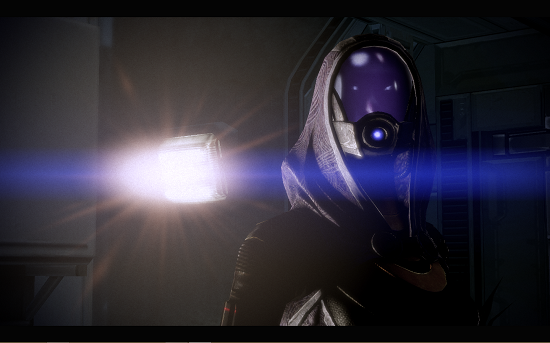
Tali
First there was the production values. A game featuring a cast of voice actors that includes Seth Green, Jennifer Hale, Tricia Helfer, Michael Dorn, Marina Sirtis, Carrie-Anne Moss, and Martin Sheen showed the developers were taking things very seriously. Combined with the existence of two art books detailing the thought that went into the look and feel of the universe, and I knew I had to experience this.
Then there was the game play itself. After my post on Star Trek Online (STO) several readers told me to check out ME. The gameplay reminded me of STO’s, but it was cleaner, less of a grind, much more strategic. Not only that, but the action was only half of the gameplay, the other half was dialogue and storytelling. And what was really fascinating was the method of storytelling.
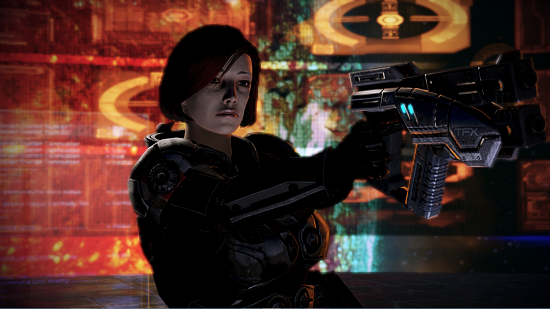
My Shepard
I wondered while I was installing ME, why the game needed 10 gigs of hard drive space, and soon learned that it was needed to hold all the different possible narratives and paths you can take through the games. Decisions you make in the first ME will have repercussions in the second and third editions. Depending on the background you choose for your character (Spacer, Colonist, Earthborn) and the nature of that background (Sole Survivor, War Hero, Ruthless), other characters will interact with you differently. By investing the player in the action the medium gets the player emotionally involved with the narrative in a way movies and novels cannot. For the first time, I felt compelled to record some of my gameplay because my experiences in ME were unique to those of other players.
The Mass Effect Universe
ME reminds me much of Vernor Vinge’s A Fire Upon Deep, an ancient universe with a long history where humans are new on the scene. ME’s galaxy grows out of the mass relays, a network of devices built by an unknown ancient alien race that allow for instantaneous travel anywhere in the galaxy. The capitol of the galaxy, the Citadel, is also an ancient structure whose origin is equally mysterious. The result is a very old galaxy filled with more history than anyone knows about.
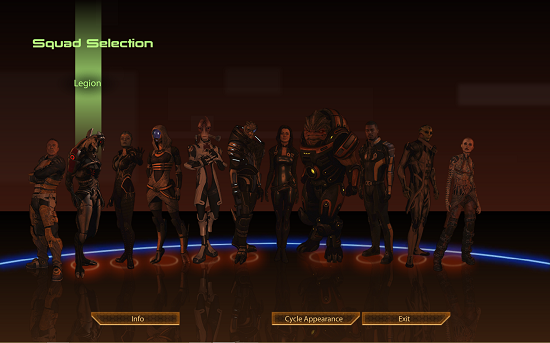
Squad Members
Although ME does fall into the problem of making most aliens humanoid, I learned that this was because the game’s physics engine and action sequences necessitated it. Despite this, the artists and creators have done an amazing job populating ME so that humans are the minority trying to win the respect of the established civilizations. The aliens themselves are a fascinating assortment of characters adding flavor to the fantastic scenery. The Elcor describe their emotions in flat tones without expression (ie. “annoyed”). The mysterious Keepers, insects who quietly maintain the Citadel. The Quarians who have grown so weak, they must hide in protective suits to prevent infections from killing them and who migrate around the galaxy without a home since the AI’s they invented ousted them. The logical Salarians who’s short lifespans make them highly type-A, quick-talking, and impatient. The humpbacked Krogan who the salarians uplifted as warriors and then oppressed with biological warfare. The Asari all-female race who mix DNA from other species into their offspring and live for thousands of years.
And that’s just a sampling of the diversity.
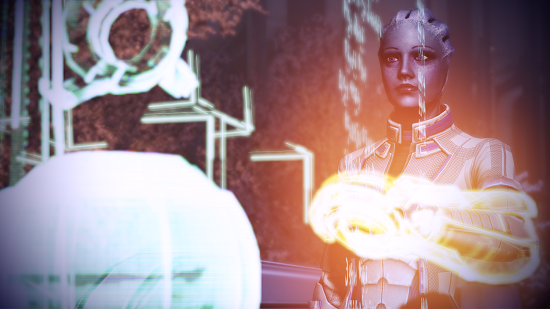
Liara
ME is also very heavy on the “Advanced technology being indistiguishable from magic” meme. With the Asari exhibiting seemingly magical powers explained through biology. The characters being able to play as adepts, who can affect the physical world with the power of the mind, or techs who use technology like it is magic. There is much in the ME universe that feels like magic, except for the story taking place solidly in science fiction.
Mass Effect Culture and Philosophy
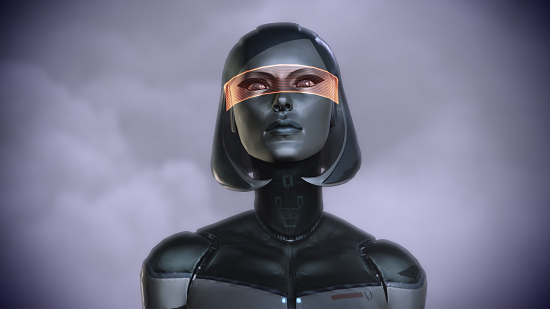
Edi
All of the above, the gameplay and setting, are really just a foundation for where ME thrives: the cultural and philosophical issues it explores. There’s the old sf issue of synthetic life and the rights it has as well as the possibility of its sentience. This is most apparent in the Geth race, invented by the Quarians, oppressed by those of feared the idea of them having souls, and who see biological life as a curiosity. A Geth ally, Legion, tells the story of their society placing a false story on the *internet* as an experiment about how a group of stars, when viewed from a certain angle, resemble a Salarian goddess, and how this started a war between believers and heretics until it was disproved. The issues of synthesis and life are explored more personally in the second game, when Shepard is killed and brought back to life as a synthetic being herself. Then there is Edi, the ship’s AI, who obtains a body in the third ME and begins exploring a romantic relationship with the ship’s navigator.
Along the same lines are the responsibilities of an engineer to an uplifted species. The Salarians uplifted the Krogan as a biological weapon to fight another alien species. Then, when the Krogan began to overpopulate and threaten the galaxy, the Salarians engineered a phage that caused 999 out of 1000 krogans to be stillborn. The practicality of this solution and the ethical conflict are explored through the salarian character Mordin, who both feels the phage was necessary, but also sees the need to free the Krogan from it. At one point we can’t help but feel conflicted as he describes the incredible feat of engineering he performed in inventing the phage, making it stunt Krogan population growth, but not drive the species to extinction.
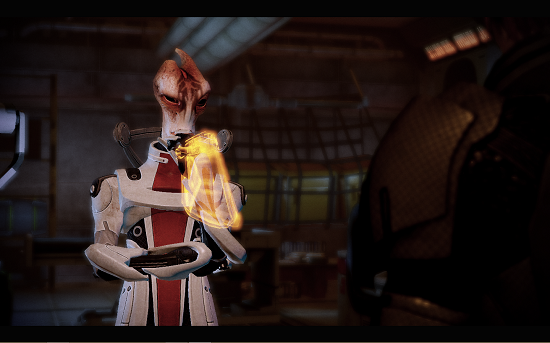
Mordin
Then there are the glimpses into other cultures and their ethical dilemmas. The Asari world Illium is like Capitalism to the extreme, where indentured servitude is legal, but also the only recourse for individuals who have fallen on hard times financially. On this world, we also meet a young Asari girl who is being wooed by a Krogan and unsure if she wants to pursue the relationship. She complains that Krogans have long lifespans and are therefore a serious commitment. It’s not like mating with a human where “you just stick it out for a century.”
At the same time, the game makes nothing out of same sex relationships. You’ll meet a tough-guy marine who talks about his concern for a husband back on Earth. You’ll have the opportunity as a male or female to engage in relationships with a wide variety of characters of opposite, same, or alien sex. And the game doesn’t shy away from an R-rating for the romantic scenes. That’s awesome.
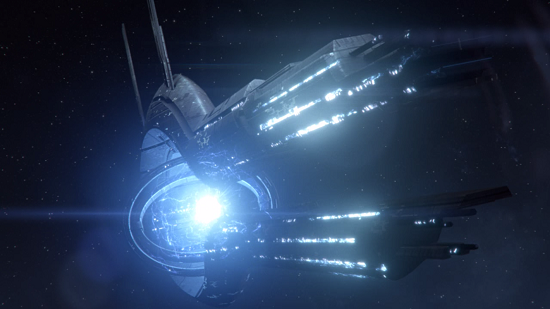
Mass Relay
The alternative timelines in Mass Effect’s game play also start to play with your head philosophically. There is no “canon” in ME, or at least I hope there never is. The myriad possible outcomes are all equally valid. At one point I went back several hours of gameplay to save one character from dying. Later, another of my favorite characters died, but I learned that it was decisions I had made in an earlier game that had doomed her. Although I played the game as a paragon of virtue, I’m obliged now to one day replay the trilogy as a renegade and experience the game in an entirely different narrative, helping humans dominate, exploring other love interests, and showing less grace. ME is like a laboratory where you get to explore the different directions a life can go if one’s attitude and choices were different.
Epic Endinges (Spoilers)
If you have no intention of playing ME, and I understand it’s a huge investment, then continue reading; otherwise, STOP. Although the endings of ME garnered much outrage online (see also here, here, here, and here), to the point that fans actually argued that the whole thing was an hallucination; I personally experienced the extended cut and I absolutely loved it. It was @#$%ing epic and great science fiction.

Reaper Sentient Ship
In the first ME, we learn that the mass effect relays and Citadel were actually built by a race of synthetic aliens known as the Reapers, who dwell outside of the galaxy but invade every 50,000 years to harvest all intelligent life in the galaxy. The last time they invaded, they left humanity alone because we were still evolving. In ME3 they come after Earth with a vengeance.
What’s interesting about the Reapers, is that they are not evil. Despite looking monstrous, despite turning all life into scary robotic zombies, we learn that they are simply doing what they were engineered to do. As the Reaper creator tells us, “When fire burns, is it at war? Is it in conflict? Or is it simply doing what it was created to do? We are no different.” The reaper creator, the Catalyst, an AI living within the Citadel, was invented by an ancient aquatic race known as the Leviathans who were seeking a solution the the problem of synthetic life coexisting with its creators. The AI’s solution was to fuse biological and synthetic life, render it inert and preserve it in stasis. Thus, the Reapers invade to harvest intelligent life before conflict arises and preserve it, enforcing peace. The Catalyst notes that its creators did not like this solution.
The game offers four possible endings: denial, destruction, control and synthesis. Depending on your personality, one will appeal more than the other. The denial ending is actually an Easter egg, where you reject all three possibilities and let the Reapers win. The game then jumps to a distant future where an old recording of your adventures is discovered by archaeologists. In Destruction, you choose to destroy all synthetic technology, meaning the destruction of all ships, all AIs (including Edi), and even yourself as a cyborg. For some reason, this is also the only ending where you appear to come back to life at the end. Control seems to simply shift the status quo from synthetic dominance to biological, meaning a new cycle of conflict will certainly arise again in the distant future.
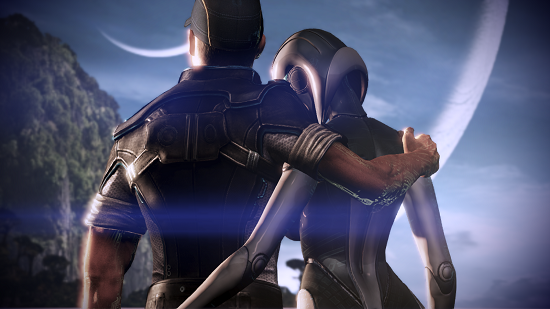
Synthesis
The “best” ending, and my favorite, is synthesis. In this timeline biological and synthetic life merge, becoming the same thing. This is the most positive ending, with images of a fantastic future of artificial and biological life coexisting to move on to larger and more fantastic things. Synthesis is the most thematically satisfying if you’re a hardcore sci fi fan like me. It mirrors the ending of Star Trek the Motion Picture and my own book The Spiraling Web. It’s a visionary concept, if you don’t think about it too deeply, and a highly inspiring conclusion to questions about what is life, themes of responsibilities of creators to creations, and touches the fringes of science becoming magic.
Additional Notes
The Mass Effect Codex is an amazing resource for deeper exploration of a universe already deeply explored in the games.
Flickr Sets from my adventures in the game.
If you have an hour and a half, you can watch the synthesis ending with my Shepard. Video and sound quality isn’t the greatest as this is my first attempt to record gameplay: